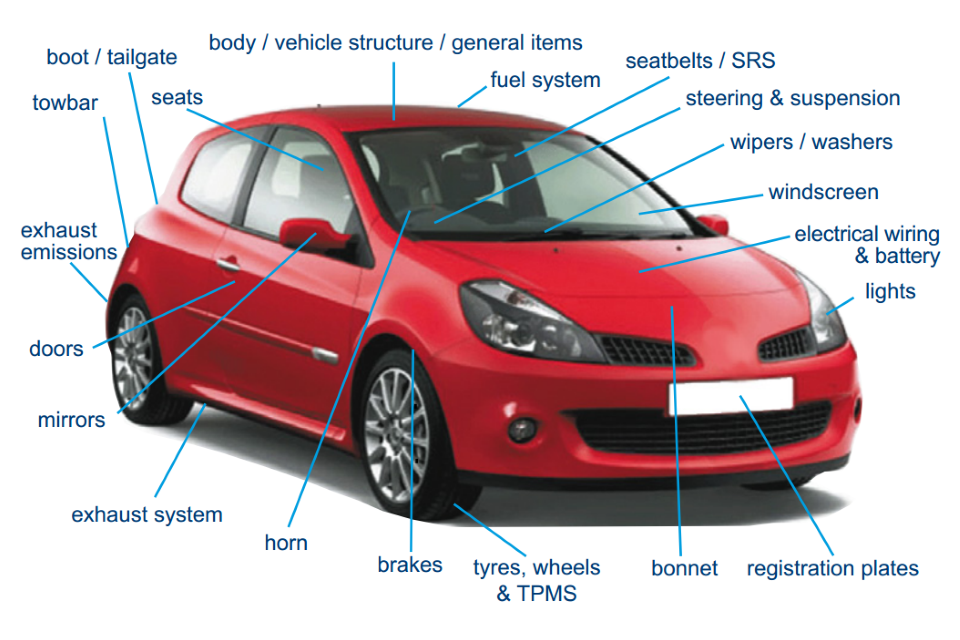Before an MOT test, you should check lights, tyres, brakes, mirrors, wipers, and fluid levels to avoid failing on simple issues. Most MOT failures come from small faults that can be fixed at home within minutes. Spending just 15 minutes on pre-MOT checks can save you money, time, and the hassle of a retest.
Why Preparing for an MOT Matters
Every year, thousands of cars fail their MOTs for avoidable reasons like blown bulbs, worn tyres, or an empty washer bottle. A failed MOT not only means repair costs but also potential downtime, as you may not legally drive your car until it passes. By preparing in advance, you increase your chance of passing the first time and avoid paying for a retest.
MOT Pre-Check: What to Do Before an MOT
Here’s a practical checklist that covers the most common reasons for MOT failures and how to fix them before test day.
Lights and Indicators
-
Test all lights: headlights, brake lights, side lights, fog lights, reverse lights, and number plate light.
-
Replace faulty bulbs (most cost under £5).
-
Check the indicator warning sound inside the car.
Tyres
-
Legal tread depth in the UK is 1.6mm across the central three-quarters.
-
Use a 20p coin test to check the tread quickly.
-
Inflate tyres to the manufacturer’s recommended pressure.
-
Inspect for cuts, bulges, or uneven wear.
Brakes
-
Test the handbrake, does it hold firmly on a hill?
-
Check pedal resistance; spongy brakes may mean air or leaks.
-
Listen for squeaks or grinding noises.
-
Brake warning lights should not be on.
Windscreen, Wipers, and Washers
-
Ensure the driver’s view is clear.
-
No cracks larger than 10mm in the driver’s line of sight.
-
No cracks larger than 40mm anywhere else.
-
Replace worn wipers and top up washer fluid.
Mirrors
- Ensure rear-view and both wing mirrors are secure and not cracked.
Seatbelts
-
Test by pulling sharply; they should lock.
-
Check for fraying or cuts.
Horn
- Must sound clearly and be loud enough to warn other drivers.
Number Plates
-
Must be clean and legible.
-
Correct font, spacing, and no damage.
-
Lights working at night.
Exhaust and Emissions
-
Listen for rattles or loud noises.
-
Excessive smoke from the exhaust may cause a fail.
-
Engine warning light must not be on.
Vehicle Cleanliness
-
Remove clutter from dashboard, seats, and boot.
-
A dirty car can sometimes result in test refusal.

Paperwork to Prepare Before an MOT
-
MOT certificate (if not your first MOT).
-
V5C logbook if details need updating.
-
Service history (optional but useful).
Common Reasons Cars Fail MOT
Here are the top causes of MOT failures in the UK:
| Fault | Quick Fix Before MOT |
|---|---|
| Blown bulbs | Replace with new bulb |
| Worn tyres | Check tread, replace if needed |
| Windscreen cracks | Repair or replace screen |
| Number plate issues | Clean or replace plate |
| Washer fluid empty | Fill washer bottle |
Quick Tips to Increase Your MOT Pass Rate
-
Service + MOT together – garages often offer discounts.
-
Warm the engine before test – helps with emissions.
-
Fix warning lights in advance – dashboard errors = automatic fail.
-
Book early – gives time for repairs if needed.
Cost of MOT vs. Retest
-
Maximum MOT fee for cars in the UK: £54.85.
-
Retest rules:
-
Free retest if issues fixed same day at same garage.
-
Partial retest fee may apply for minor repairs within 10 days.
-
| MOT Service | Cost (Approx.) |
|---|---|
| Standard MOT (car) | £54.85 |
| MOT + Service Bundle | £100–£200 |
| MOT Retest (same day) | Free |
| MOT Retest (within 10 days) | £20–£30 |
MOT Exemptions
Some vehicles don’t require an MOT:
-
Cars under 3 years old.
-
Classic cars over 40 years old (if no substantial modifications).
On MOT Day: What to Expect
-
Takes about 45 minutes to 1 hour.
-
If you pass, you’ll get a certificate valid for 12 months.
-
If you fail, you’ll get a “refusal of MOT certificate” (VT30) with reasons for failure.
-
You can still drive your car only if the old MOT is still valid and no “dangerous defects” were found.
Most MOT failures are due to minor, avoidable issues like bulbs, tyres, and washer fluid. Doing a quick pre-MOT check ensures your car is safe, saves money on retests, and keeps you on the road without delays.
FAQ
How do I prepare my car for an MOT?
Check tyres, lights, brakes, wipers, mirrors, seatbelts, fluids, and ensure the car is clean.
What are the most common MOT fails?
Blown bulbs, worn tyres, dirty windscreen, empty washer fluid, and number plate issues.
Can I drive my car if it fails MOT?
You can only drive if the previous MOT is still valid and no dangerous defects were found.
Should I service my car before MOT?
Yes, a service can catch issues that may cause a fail, especially with brakes and emissions.
Do I need documents for MOT?
Usually, no. The garage can check MOT history online, but keeping your certificate and logbook is helpful.